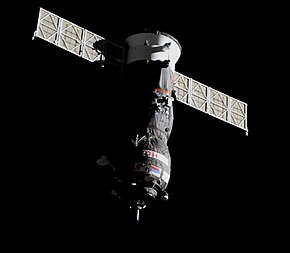Progress MS-18
 Docking of Progress 76P | |
| Names | Progress 79P |
|---|---|
| Mission type | ISS resupply |
| Operator | Roscosmos |
| COSPAR ID | 2021-098A |
| SATCAT no. | 49379 |
| Mission duration | 334 days (planned) |
| Spacecraft properties | |
| Spacecraft | Progress MS-18 |
| Spacecraft type | Progress-MS |
| Manufacturer | Energia |
| Launch mass | 7000 kg |
| Start of mission | |
| Launch date | 18 August 2021 (planned) [1][2][3] |
| Rocket | Soyuz-2.1a |
| Launch site | Baikonur, Site 31 |
| Contractor | Progress Rocket Space Centre |
| End of mission | |
| Disposal | Deorbited (planned) |
| Orbital parameters | |
| Reference system | Geocentric orbit |
| Regime | Low Earth orbit |
| Inclination | 51.65° |
| Docking with ISS | |
Progress ISS Resupply | |
Progress MS-18 (Template:Lang-ru), Russian production No. 447, identified by NASA as Progress 79P, is a Progress spacecraft launched by Roscosmos to resupply the International Space Station (ISS). This will be the 170th flight of a Progress spacecraft.
History
The Progress-MS is a uncrewed freighter based on the Progress-M featuring improved avionics. This improved variant first launched on 21 December 2015. It has the following improvements:[4][5][6][7]
- New external compartment that enables it to deploy satellites. Each compartment can hold up to four launch containers. First time installed on Progress MS-03.
- Enhanced redundancy thanks to the addition of a backup system of electrical motors for the docking and sealing mechanism.
- Improved Micrometeoroid (MMOD) protection with additional panels in the cargo compartment.
- Luch Russian relay satellites link capabilities enable telemetry and control even when not in direct view of ground radio stations.
- GNSS autonomous navigation enables real time determination of the status vector and orbital parameters dispensing with the need of ground station orbit determination.
- Real time relative navigation thanks to direct radio data exchange capabilities with the space station.
- New digital radio that enables enhanced TV camera view for the docking operations.
- The Ukrainian Chezara Kvant-V on board radio system and antenna/feeder system has been replaced with a Unified Command Telemetry System (UCTS).
- Replacement of the Kurs A with Kurs NA digital system.
Launch
A Soyuz-2.1a will launch Progress MS-18 to the International Space Station from Baikonur Site 31 18 August 2021 on a fast-track trajectory.[1][2][3] Around 3 hours 20 minutes after the launch, Progress MS-18 will automatically dock to Russian Orbital Segment (ROS) of ISS. The vehicle is expected to dock to the aft port of the Zvezda Service Module (SM) and remain in orbit for 334 days, supporting the long-duration Expedition 65 and Expedition 66 missions aboard the ISS.
Cargo
The Progress MS-18 spacecraft is loaded with 0 kg (0 lb) of cargo, with 0 kg (0 lb) of this being dry cargo.
- Dry cargo: 0 kg (0 lb)
- Fuel: 0 kg (0 lb)
- Oxygen: 0 kg (0 lb)
- Water: 0 kg (0 lb)
Undocking and decay
The Progress MS-18 is scheduled to remain docked at the station through late 2021, when it will depart with trash and re-enter the Earth's atmosphere for destruction over the South Pacific Ocean.
See also
References
- ^ a b Zak, Anatoly (10 October 2020). "Planned Russian space missions in 2021". RussianSpaceWeb. Retrieved 13 October 2020.
- ^ a b "Launch Schedule". Spaceflight Now. 31 August 2020. Retrieved 3 October 2020.
- ^ a b "Status - Progress MS-18". NextSpaceflight. 1 September 2020. Retrieved 3 October 2020.
- ^ Krebs, Gunter (1 December 2015). "Progress-MS 01-19". Gunter's Space Page. Retrieved 3 October 2020.
- ^ "Progress MS-18". NSSDCA. NASA. 14 May 2020. Retrieved 3 October 2020.
 This article incorporates text from this source, which is in the public domain.
This article incorporates text from this source, which is in the public domain.
- ^ Zak, Anatoly. "Progress-MS". RussianSpaceWeb. Retrieved 3 October 2020.
- ^ Blau, Patrick (1 December 2015). "Progress MS Spacecraft". Spaceflight101. Retrieved 17 November 2020.

